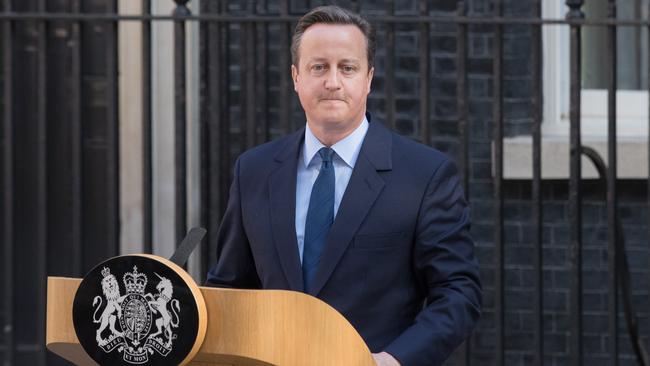In any vote you must be careful what you wish for

The long-term consequences will be significant.
How has it come to this? How could the birthplace of Westminster democracy incur such self-inflicted harm?
Failures of leadership are partly to blame, as are the spoiling tactics and naked self-interest of some politicians. There have also been many missteps and misjudgments. At almost every stage, political leaders have got it wrong.
The most important misstep occurred right at the beginning. It was the decision that cost prime minister David Cameron his job. He responded to calls to leave the EU by putting the question to the British people at a referendum on June 23, 2016. Cameron expected voters to choose to remain, and the design of the referendum reflected his complacency. The referendum was perfectly serviceable if voters stuck with the status quo, but deeply flawed should Britons choose to leave the EU.
The potential for a constitutional train wreck was clear. Britain had ignored the lessons of other countries, including Australia, about the running of referendums. Australia especially has much to contribute because referendums are more common here, as they are the only way to change our Constitution.
These votes have been put to the people 44 times since 1901. Only eight have passed, demonstrating how readily voters have defied their political leaders.
Australia’s experience demonstrates two rules. First, a referendum should be held only when there is no other choice. In requiring a yes-or-no vote, referendums polarise the political debate. It is almost always better to resolve contested questions through parliamentary debate and elections. They are a better forum to test ideas and public support, and lend themselves to compromise rather than conflict.
Referendums pose dangers to parliamentary democracy in Australia, Britain and similar countries. The Westminster system depends on elected representatives making decisions on behalf of constituents. Referendums run counter to this in offering a direct means of people voicing opinions. This can give rise to deadlock when the popular voice cannot be reconciled with the composition of parliament. This occurred last week when the British parliament rejected all eight of the methods of achieving Brexit. Not one received majority support from elected representatives despite the people voting in favour of Brexit.
The second rule is that referendums must be about specific questions. In Australia, the people vote knowing the exact words of the change proposed to the Constitution. This detail is needed lest there be doubt about what the people have decided. The alternative is a referendum verdict left open to interpretation.
This can be disempowering for the people, and can generate considerable community anger, because politicians can manipulate the result to suit their own ends. It can also lead to confusion and gridlock in parliament as politicians with different views each claim a popular mandate.
This again is what has occurred in Britain. The question put to voters in 2016 was: “Should the United Kingdom remain a member of the European Union or leave the European Union?” The vote to leave won by 52 per cent to 48.
What was not clear is the terms on which people voted to leave the EU. Did people vote to leave the EU while remaining in a customs union? Or did they support severing all ties? Or something in between? The answer is that the majority vote consisted of people who supported these options, and more, as well as people who gave no thought at all to such questions.
This was the most serious flaw in the Brexit referendum. It enabled the Leave vote to succeed without a majority in favour of any particular outcome. This undermined the legitimacy of the referendum because the result could have been different had people voted on a specific proposal.
The deep divisions among those who want to leave the EU are such that a specific proposal could have divided their camp and led to a win for the status quo.
Australia went through a similar experience in its failed 1999 referendum on the republic. This was a vote on a specific type of republic in which the president would be appointed by parliament. Opinion polls showed most Australians favoured becoming a republic, but many voted no because they preferred a different type of republic in which the president would be directly elected by the people. Having a specific question changed the outcome from a probable yes vote to a narrow defeat.
From an Australian perspective, Britain’s problems were sadly predictable. Many mistakes have been made, but none larger than the initial decision to hold a flawed referendum. The British people voted to leave the EU, but nobody knows on what terms.
George Williams is dean of law at the University of NSW.



It is painful to watch Britain tying itself in knots over its decision to leave the EU. The costs will be very high. An exasperated public is losing confidence in its institutions, and the traditions and conventions that underpin British democracy are being damaged.